2017-2018学年度北师大版必修五_Unit14Careers_Lesson_1课件(41张)
文档属性
| 名称 | 2017-2018学年度北师大版必修五_Unit14Careers_Lesson_1课件(41张) |
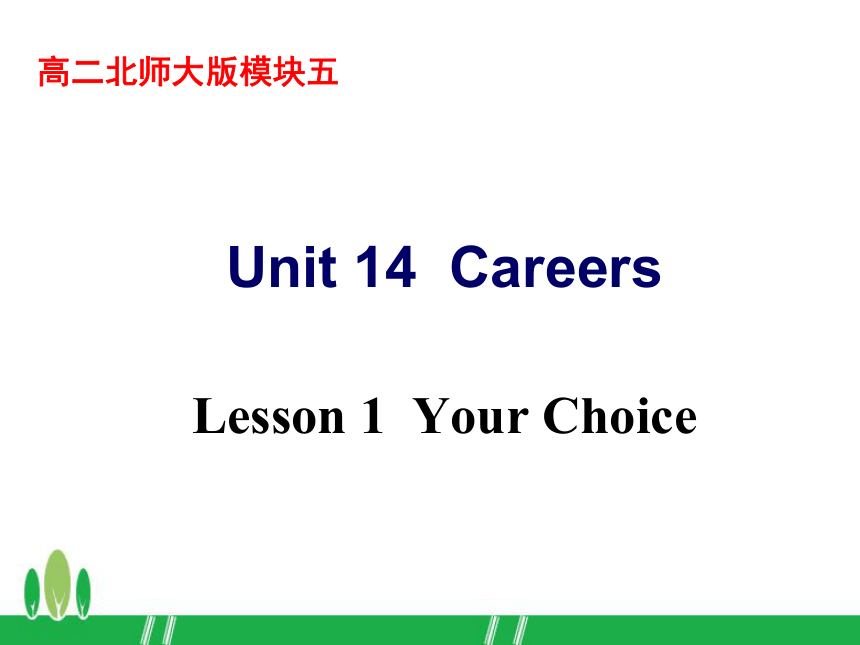
|
|
| 格式 | zip | ||
| 文件大小 | 513.4KB | ||
| 资源类型 | 教案 | ||
| 版本资源 | 北师大版 | ||
| 科目 | 英语 | ||
| 更新时间 | 2017-10-28 00:00:00 | ||
图片预览

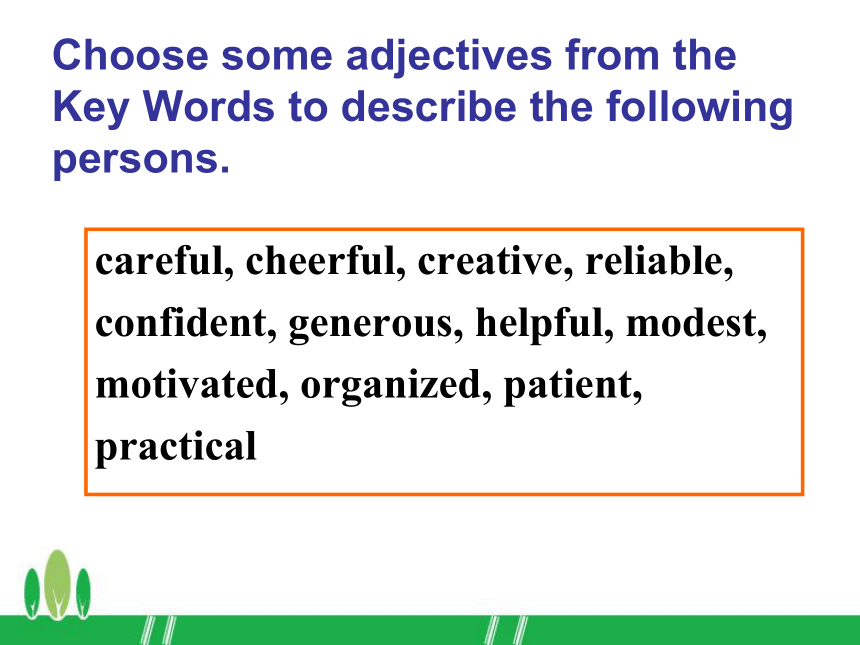
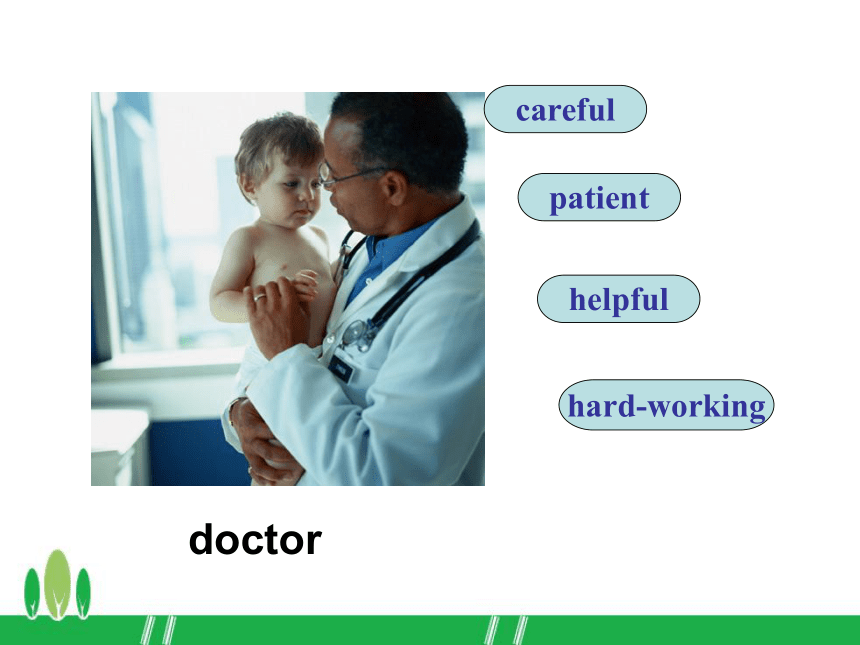
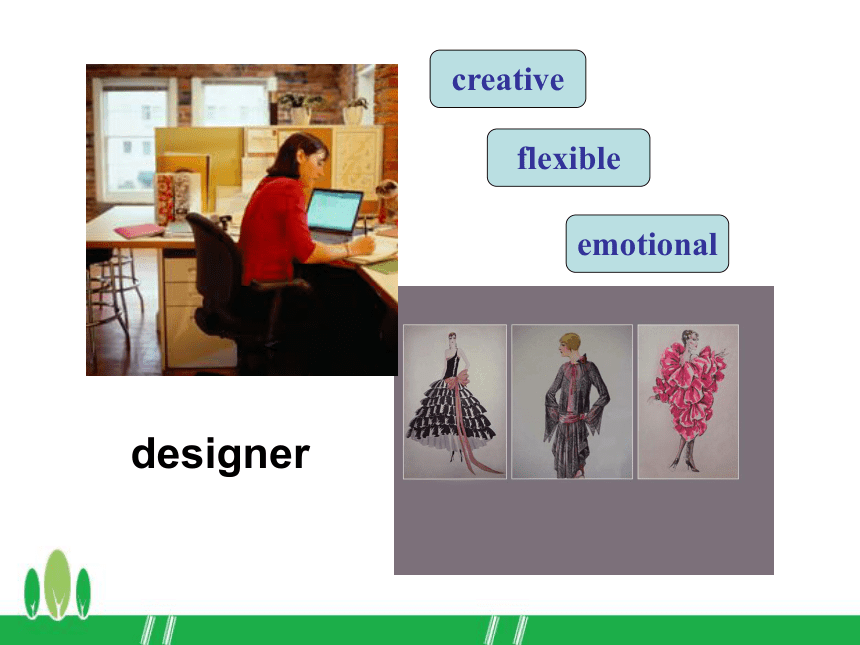

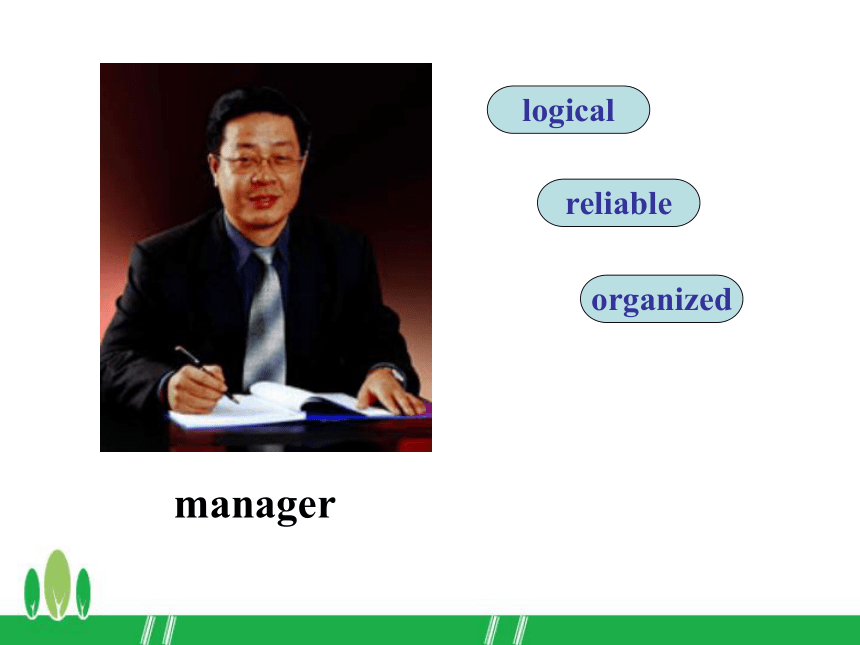
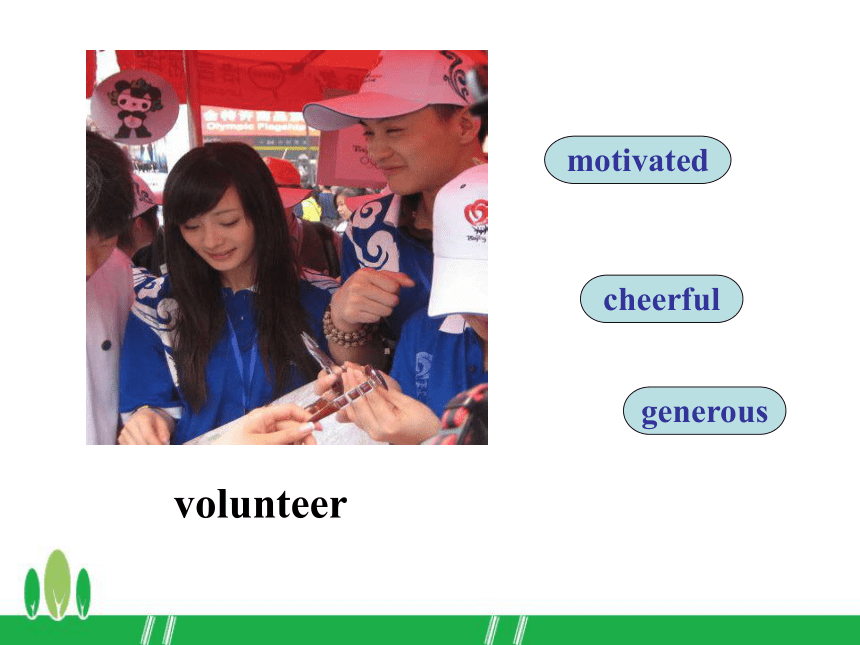
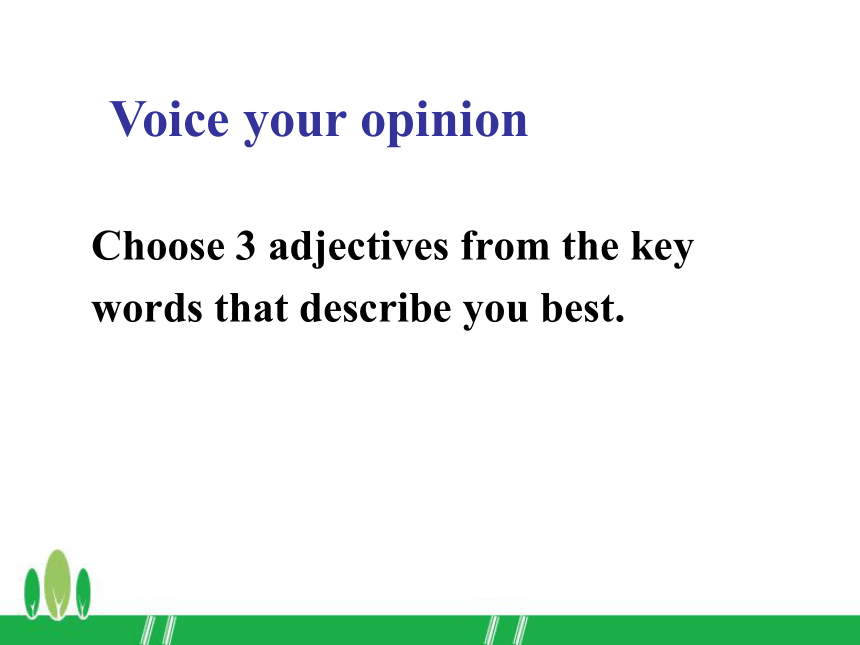
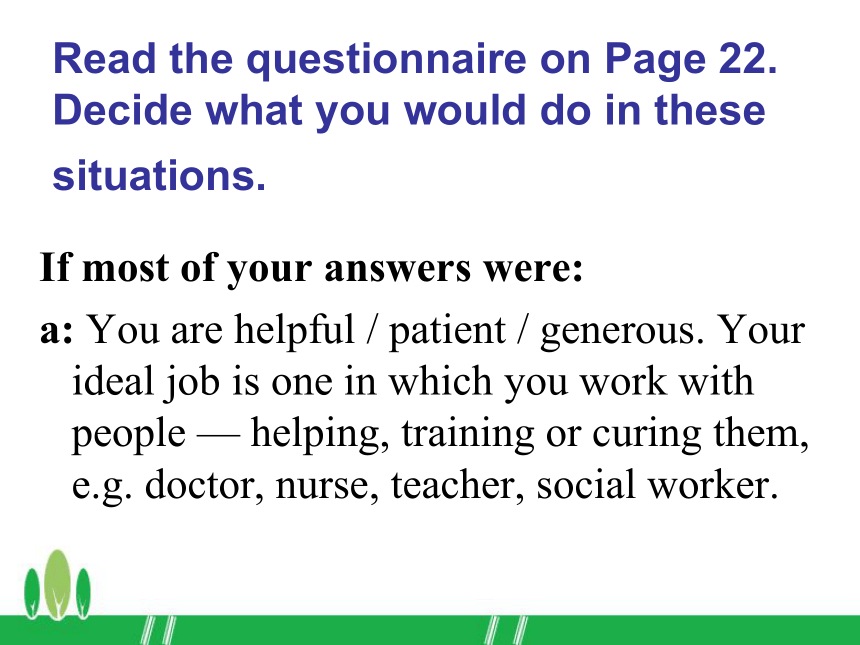
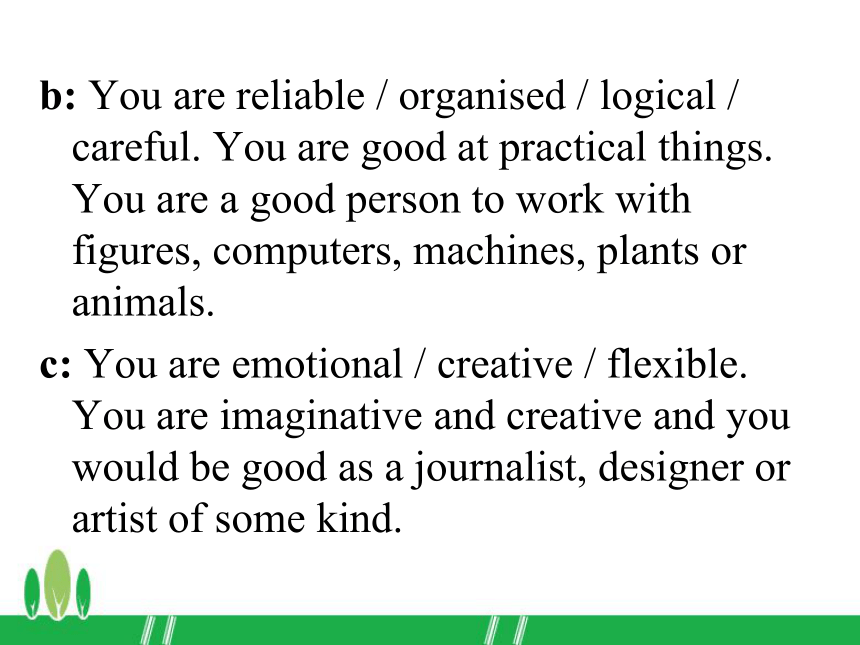
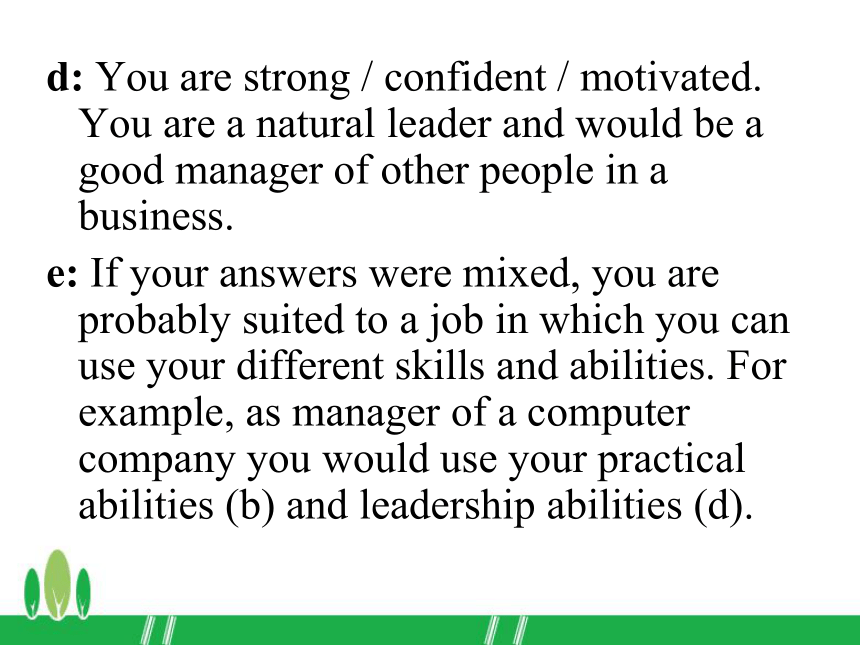
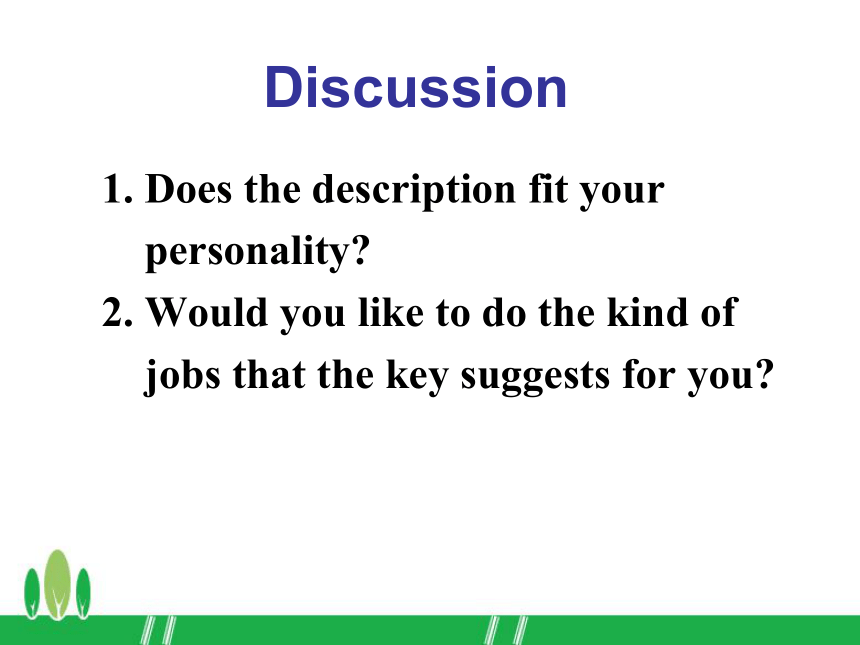
文档简介
课件41张PPT。高二北师大版模块五
Unit 14 Careers
Lesson 1 Your ChoiceChoose some adjectives from the Key Words to describe the following persons.careful, cheerful, creative, reliable,
confident, generous, helpful, modest,
motivated, organized, patient,
practicalcarefulpatienthelpfulhard-workingdoctorcreativeflexibledesigneremotionalpoliticianstrongconfidentmanagerlogicalreliableorganizedvolunteermotivatedcheerfulgenerousChoose 3 adjectives from the key words that describe you best.Voice your opinionRead the questionnaire on Page 22. Decide what you would do in these situations. If most of your answers were:
a: You are helpful / patient / generous. Your ideal job is one in which you work with people — helping, training or curing them, e.g. doctor, nurse, teacher, social worker.b: You are reliable / organised / logical / careful. You are good at practical things. You are a good person to work with figures, computers, machines, plants or animals.
c: You are emotional / creative / flexible. You are imaginative and creative and you would be good as a journalist, designer or artist of some kind.d: You are strong / confident / motivated. You are a natural leader and would be a good manager of other people in a business.
e: If your answers were mixed, you are probably suited to a job in which you can use your different skills and abilities. For example, as manager of a computer company you would use your practical abilities (b) and leadership abilities (d). 1. Does the description fit your
personality?
2. Would you like to do the kind of
jobs that the key suggests for you?DiscussionA friend is having problems writing a plot
summary for a book report.
一位朋友在为一份读书报告写情节摘要时遇到了
一些困难。
1.have problems (in) doing sth.做某事有困难
该短语中的 problems 可用 trouble 或 difficulty 代
替,而且可以用 no, little, some, great 等词修饰,
表示困难的程度。
如:
I have some problems/trouble/difficulty (in)
reading her handwriting.我认她的笔迹有些困难。
Language points拓展 have a good time/fun (in) doing sth.
做某事很开心
have a hard time (in) doing sth.
做某事很辛苦
练习: 完成句子
(1)We __________________________(难以
理解) what he said.
(2)They seem to ___________________________
( 工作得很开心) in this company.had problems (in) understanding have a good time/fun (in) working2.summary n.摘要,总结 adj.概括的,扼要的
(1)作名词时是可数名词,后常接介词 of,表示
“……摘要,……总结”。如:
He made a summary of the case.
他为这个案件做了一个摘要。
(2)作形容词时,无比较等级。如:
He gave a summary report of the day's events.
他对一天的事件作了简要的报告。
拓展 in summary 总的来说,简要地说
make a summary 做摘要/总结练习: 完成句子(1)He _________________ (做总结) what he
had done.(2)I went through by ________________ (一
个简易的方法).made a summary of a summary method
Tell her to phone you if she needs any more
guidance.
告诉她如果需要更多的指导就给你打电话。3.guidance n.指导
We would appreciate guidance from an expert in this
field.我们将欢迎该领域专家的指导。
拓展 under sb's guidance 在某人的指导下
take sb.under one's guidance 置某人于自己的庇护之下
练习: 完成句子
________________ (在他的指导下), we finished
the work smoothly.Under his guidance You are working for an institute that gives aid
to the poor in a small village.
你在一个小村子里的为贫困户提供帮助的机构里工作。4.aid n.援助,帮助 vt.有助于;帮助,救助,支援
如:
He should be able to read this without the aid of a
dictionary.
他应当能够不用字典就能读懂这个。
A good dictionary can aid language learning.
一部好词典有助于语言学习。
She made no effort to aid Sophia.
她没有努力去帮助索菲娅。
拓展 in aid of 为了帮助……
by/with the aid of 通过……的帮助
do/give/offer first aid 进行急救
aid sb.in (doing) sth.在某方面帮助某人
练习: 完成句子(1)Germs can only be seen _______________
(借助) a microscope.
(2)The collection is _________(为了帮助) the blind
(3)He raised the money to ___________(帮助穷人).
with/by the aid of in aid of aid the poor5. set an example 树立榜样
set 可接双宾语,若双宾语易位,通常用介词 to,即
set an example to sb.=set sb.an example。 example
前可用 good,bad 等词修饰。如:
She arrived at the office early to set an example to
the others.
为了给他人作表率,她很早就来到办公室。
Choose one of the hardest jobs for yourself to
set an example.
自己承担一项最艰巨的任务以作表率。拓展 for example 例如give an example to 给……树立榜样
follow sb's example 学习某人,以某人为榜样
take sb.as an example 以某人为榜样take sb./sth.for example 以某人/某事为例练习: 完成句子(1)Her diligence has ________________ (为……
树立了榜样) the others.
(2)He said he would _________________________
_________(以她为榜样).
set an example to take her as an example/follow
her example (3)___________ (例如), London is the capital of
Britain.
For exampleNo one is hurt, but you are stuck on a forest
road with no traffic.
虽然无人受伤,但是车陷在了一条不能通车的林间
小路上。
6.be stuck on 陷入,卡住
be stuck=get stuck,其后所接的介词根据该短语后
的名词而定,可用 in, on, at 等。如:
Our car seems to be/get stuck in the mud.
我们的车好像陷入了泥坑里。
练习: 用适当的介词填空(1)What would you do when you were stuck
___ a forest alone?
(2)Stuck _____home like that, she felt bored.
(3)This morning I was stuck _____ the bus for
nearly an hour.
in at on 直接引语与间接引语(I) (Direct Speech and Indirect Speech)1.定义:A.直接引述别人的话,叫 “直接引语”。B.用自己的话转述别人的话,叫“间接引语”。间接引语在多数情况下构成宾语从句。直接引语一般前后要加引号,间接引语不用引号。 2. 人称的变化
他说:“我非常喜欢它.”
他说他非常喜欢它.
He said,“I like it very much.”He said that he liked it very much.3. 祈使句句型:
tell/ask/order/advise/warn/request sb.
1) “Put on your clothes," she said to her little
son.
She told her little son to put on his clothes.
2) “Don’t smoke in the room,” he said to me.
He ordered me not to smoke in the room.to do sth.
not to do sth.1. “Could you lend me a pen?”
Peter asked me _______________ .
2. “Don’t lose the receipt.”
The salesgirl instructed the shopper
_____________________.
3. “Check for errors, please.”
The teacher ordered the class
__________________.Exercisesto lend him a pennot to lose the receiptto check for errorsComplete the following sentences:4. “Can you give me a lift home?”
Mary asked John ___________________.
5. “Don’t drink that liquid. I don’t think it’s
water.”
The boy advised the girl ______________
_______.
6. “Read the text and answer the
comprehension questions.”
The teacher told the students ___________
_________________________________. to give her a lift homenot to drink thatand answer the comprehension questionsto read the textliquidRead the notice and report each piece of advice.Be friendly and kind.
Don’t wear very casual clothes.
Be kind and co-operative.
Don’t share very personal information – you don’t know who you are talking to.
Don’t try to make friends with your boss.
Listen rather than speak – learn as much as possible about your job and your company.
Work hard and don’t spend too much time chatting and resting.
Keep your desk tidy all times.
Don’t quarrel with anyone.2. Don’t wear very casual clothes.
The notice tells you not to wear very casual
clothes.
3. Be kind and co-operative.
4. Don’t share very personal information – you don’t know who you are talking to.For example: The notice advises you to be
friendly and kind.The notice tells you to be kind and co-operative.The notice advises you not to share very
personal information if you don’t know who
you are talking to.5. Don’t try to make friends with your boss.
The notice tells you not to try to make friends with your boss.
6. Listen rather than speak – learn as much as possible about your job and your company.
The notice tells you to listen rather than speak and learn as much as possible about your job and your company.
7. Work hard and don’t spend too much time chatting and resting.
The notice tells you to work hard and not to spend too much time chatting and resting.8. Keep your desk tidy all times.
The notice tells you to keep your desk tidy all times.
9. Don’t quarrel with anyone.
The notice advises you not to quarrel with anyone.4. 陈述句
直接引语如果是陈述句,变为间接引语时,用连词that引导。从句的人称、时态、指示代词、时间状语、地点状语等要作相应的变化。 He said, “I like it very much.”He said that he liked it very much.他说:“我非常喜欢它。”
他说他非常喜欢它。 5. 时态的变化一般现在时→
一般过去时现在进行时→
过去进行时现在完成时→
过去完成时一般过去时→
过去完成时过去完成时
不变一般将来时→
过去将来时6. 指示代词、时间状语、地点状语和动词的变化this →thatthese → thosenow →thentoday →
that dayyesterday →
the day beforetomorrow →
the next dayago → beforehere → therecome → go注意:
1. 直接引语如果是客观真理,变为间接引语时,时态
不变。
(1) He said, “Light travels much faster than sound.”
He said that light travels much faster than sound.
(2)“A friend in need is a friend indeed,” Mother
said to me.
Mother told me that a friend in need is a friend
indeed.
2. 如果在当地转述,here不必改为there,动词come 不必改为go。如果在当天转述, yesterday / tomorrow等时间状语也不必改变。1. “I surf the Internet every weekend,” he told me.
He told me that he surfed the Internet every weekend.
2. She replied, “I’m preparing my lessons now.”
She replied that she was preparing her lessons then.
3. “They have come here twice,” the guide said.
The guide said that they had gone there twice.
4. “I wrote a story yesterday,” the novelist answered.
The novelist answered that he had written a story the day before.Exercises5. “Last week, I had finished the report,” the student said.
The student said that he had finished the report the week before.
6. “The children will go to the zoo with us,” the teachers answered.
The teachers answered that the children would go to the zoo with them.
7. He said,” Autumn comes after summer.”
He said that autumn comes after summer.Homework1. Do Exercises 8 and 10 on
Page 23.
2. Preview Lesson 2.Goodbye!
Unit 14 Careers
Lesson 1 Your ChoiceChoose some adjectives from the Key Words to describe the following persons.careful, cheerful, creative, reliable,
confident, generous, helpful, modest,
motivated, organized, patient,
practicalcarefulpatienthelpfulhard-workingdoctorcreativeflexibledesigneremotionalpoliticianstrongconfidentmanagerlogicalreliableorganizedvolunteermotivatedcheerfulgenerousChoose 3 adjectives from the key words that describe you best.Voice your opinionRead the questionnaire on Page 22. Decide what you would do in these situations. If most of your answers were:
a: You are helpful / patient / generous. Your ideal job is one in which you work with people — helping, training or curing them, e.g. doctor, nurse, teacher, social worker.b: You are reliable / organised / logical / careful. You are good at practical things. You are a good person to work with figures, computers, machines, plants or animals.
c: You are emotional / creative / flexible. You are imaginative and creative and you would be good as a journalist, designer or artist of some kind.d: You are strong / confident / motivated. You are a natural leader and would be a good manager of other people in a business.
e: If your answers were mixed, you are probably suited to a job in which you can use your different skills and abilities. For example, as manager of a computer company you would use your practical abilities (b) and leadership abilities (d). 1. Does the description fit your
personality?
2. Would you like to do the kind of
jobs that the key suggests for you?DiscussionA friend is having problems writing a plot
summary for a book report.
一位朋友在为一份读书报告写情节摘要时遇到了
一些困难。
1.have problems (in) doing sth.做某事有困难
该短语中的 problems 可用 trouble 或 difficulty 代
替,而且可以用 no, little, some, great 等词修饰,
表示困难的程度。
如:
I have some problems/trouble/difficulty (in)
reading her handwriting.我认她的笔迹有些困难。
Language points拓展 have a good time/fun (in) doing sth.
做某事很开心
have a hard time (in) doing sth.
做某事很辛苦
练习: 完成句子
(1)We __________________________(难以
理解) what he said.
(2)They seem to ___________________________
( 工作得很开心) in this company.had problems (in) understanding have a good time/fun (in) working2.summary n.摘要,总结 adj.概括的,扼要的
(1)作名词时是可数名词,后常接介词 of,表示
“……摘要,……总结”。如:
He made a summary of the case.
他为这个案件做了一个摘要。
(2)作形容词时,无比较等级。如:
He gave a summary report of the day's events.
他对一天的事件作了简要的报告。
拓展 in summary 总的来说,简要地说
make a summary 做摘要/总结练习: 完成句子(1)He _________________ (做总结) what he
had done.(2)I went through by ________________ (一
个简易的方法).made a summary of a summary method
Tell her to phone you if she needs any more
guidance.
告诉她如果需要更多的指导就给你打电话。3.guidance n.指导
We would appreciate guidance from an expert in this
field.我们将欢迎该领域专家的指导。
拓展 under sb's guidance 在某人的指导下
take sb.under one's guidance 置某人于自己的庇护之下
练习: 完成句子
________________ (在他的指导下), we finished
the work smoothly.Under his guidance You are working for an institute that gives aid
to the poor in a small village.
你在一个小村子里的为贫困户提供帮助的机构里工作。4.aid n.援助,帮助 vt.有助于;帮助,救助,支援
如:
He should be able to read this without the aid of a
dictionary.
他应当能够不用字典就能读懂这个。
A good dictionary can aid language learning.
一部好词典有助于语言学习。
She made no effort to aid Sophia.
她没有努力去帮助索菲娅。
拓展 in aid of 为了帮助……
by/with the aid of 通过……的帮助
do/give/offer first aid 进行急救
aid sb.in (doing) sth.在某方面帮助某人
练习: 完成句子(1)Germs can only be seen _______________
(借助) a microscope.
(2)The collection is _________(为了帮助) the blind
(3)He raised the money to ___________(帮助穷人).
with/by the aid of in aid of aid the poor5. set an example 树立榜样
set 可接双宾语,若双宾语易位,通常用介词 to,即
set an example to sb.=set sb.an example。 example
前可用 good,bad 等词修饰。如:
She arrived at the office early to set an example to
the others.
为了给他人作表率,她很早就来到办公室。
Choose one of the hardest jobs for yourself to
set an example.
自己承担一项最艰巨的任务以作表率。拓展 for example 例如give an example to 给……树立榜样
follow sb's example 学习某人,以某人为榜样
take sb.as an example 以某人为榜样take sb./sth.for example 以某人/某事为例练习: 完成句子(1)Her diligence has ________________ (为……
树立了榜样) the others.
(2)He said he would _________________________
_________(以她为榜样).
set an example to take her as an example/follow
her example (3)___________ (例如), London is the capital of
Britain.
For exampleNo one is hurt, but you are stuck on a forest
road with no traffic.
虽然无人受伤,但是车陷在了一条不能通车的林间
小路上。
6.be stuck on 陷入,卡住
be stuck=get stuck,其后所接的介词根据该短语后
的名词而定,可用 in, on, at 等。如:
Our car seems to be/get stuck in the mud.
我们的车好像陷入了泥坑里。
练习: 用适当的介词填空(1)What would you do when you were stuck
___ a forest alone?
(2)Stuck _____home like that, she felt bored.
(3)This morning I was stuck _____ the bus for
nearly an hour.
in at on 直接引语与间接引语(I) (Direct Speech and Indirect Speech)1.定义:A.直接引述别人的话,叫 “直接引语”。B.用自己的话转述别人的话,叫“间接引语”。间接引语在多数情况下构成宾语从句。直接引语一般前后要加引号,间接引语不用引号。 2. 人称的变化
他说:“我非常喜欢它.”
他说他非常喜欢它.
He said,“I like it very much.”He said that he liked it very much.3. 祈使句句型:
tell/ask/order/advise/warn/request sb.
1) “Put on your clothes," she said to her little
son.
She told her little son to put on his clothes.
2) “Don’t smoke in the room,” he said to me.
He ordered me not to smoke in the room.to do sth.
not to do sth.1. “Could you lend me a pen?”
Peter asked me _______________ .
2. “Don’t lose the receipt.”
The salesgirl instructed the shopper
_____________________.
3. “Check for errors, please.”
The teacher ordered the class
__________________.Exercisesto lend him a pennot to lose the receiptto check for errorsComplete the following sentences:4. “Can you give me a lift home?”
Mary asked John ___________________.
5. “Don’t drink that liquid. I don’t think it’s
water.”
The boy advised the girl ______________
_______.
6. “Read the text and answer the
comprehension questions.”
The teacher told the students ___________
_________________________________. to give her a lift homenot to drink thatand answer the comprehension questionsto read the textliquidRead the notice and report each piece of advice.Be friendly and kind.
Don’t wear very casual clothes.
Be kind and co-operative.
Don’t share very personal information – you don’t know who you are talking to.
Don’t try to make friends with your boss.
Listen rather than speak – learn as much as possible about your job and your company.
Work hard and don’t spend too much time chatting and resting.
Keep your desk tidy all times.
Don’t quarrel with anyone.2. Don’t wear very casual clothes.
The notice tells you not to wear very casual
clothes.
3. Be kind and co-operative.
4. Don’t share very personal information – you don’t know who you are talking to.For example: The notice advises you to be
friendly and kind.The notice tells you to be kind and co-operative.The notice advises you not to share very
personal information if you don’t know who
you are talking to.5. Don’t try to make friends with your boss.
The notice tells you not to try to make friends with your boss.
6. Listen rather than speak – learn as much as possible about your job and your company.
The notice tells you to listen rather than speak and learn as much as possible about your job and your company.
7. Work hard and don’t spend too much time chatting and resting.
The notice tells you to work hard and not to spend too much time chatting and resting.8. Keep your desk tidy all times.
The notice tells you to keep your desk tidy all times.
9. Don’t quarrel with anyone.
The notice advises you not to quarrel with anyone.4. 陈述句
直接引语如果是陈述句,变为间接引语时,用连词that引导。从句的人称、时态、指示代词、时间状语、地点状语等要作相应的变化。 He said, “I like it very much.”He said that he liked it very much.他说:“我非常喜欢它。”
他说他非常喜欢它。 5. 时态的变化一般现在时→
一般过去时现在进行时→
过去进行时现在完成时→
过去完成时一般过去时→
过去完成时过去完成时
不变一般将来时→
过去将来时6. 指示代词、时间状语、地点状语和动词的变化this →thatthese → thosenow →thentoday →
that dayyesterday →
the day beforetomorrow →
the next dayago → beforehere → therecome → go注意:
1. 直接引语如果是客观真理,变为间接引语时,时态
不变。
(1) He said, “Light travels much faster than sound.”
He said that light travels much faster than sound.
(2)“A friend in need is a friend indeed,” Mother
said to me.
Mother told me that a friend in need is a friend
indeed.
2. 如果在当地转述,here不必改为there,动词come 不必改为go。如果在当天转述, yesterday / tomorrow等时间状语也不必改变。1. “I surf the Internet every weekend,” he told me.
He told me that he surfed the Internet every weekend.
2. She replied, “I’m preparing my lessons now.”
She replied that she was preparing her lessons then.
3. “They have come here twice,” the guide said.
The guide said that they had gone there twice.
4. “I wrote a story yesterday,” the novelist answered.
The novelist answered that he had written a story the day before.Exercises5. “Last week, I had finished the report,” the student said.
The student said that he had finished the report the week before.
6. “The children will go to the zoo with us,” the teachers answered.
The teachers answered that the children would go to the zoo with them.
7. He said,” Autumn comes after summer.”
He said that autumn comes after summer.Homework1. Do Exercises 8 and 10 on
Page 23.
2. Preview Lesson 2.Goodbye!
